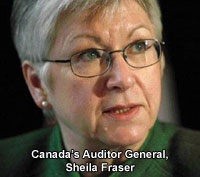
News |
- Auditor: Climate and Health Projections Needed
- Study Says If You're Alive, You Have BPA in You
- TransCanada Keystone Pipeline Nebraska Problems
- International Year of Forests 2011
- We Exceeded Nature's Budget August 21
- Fire Destroys Woodland Caribou Habitat
- G20 Class-Action Suit Filed
- Five Steps to Cut Ontario's Oil Use
- Phytoplankton Vanishing from Oceans
- Manitoba Hydro Selects Preferred Route
- New UN Panel on Global Sustainability
- Inuit Win Injunction Against Seismic Testing
| Auditor: Climate and Health Projections Needed | 7 September 10 |
 The call for concrete information about the costs of health care, including in the face of climate change impacts, came from Sheila Fraser, Auditor General of Canada. The call for concrete information about the costs of health care, including in the face of climate change impacts, came from Sheila Fraser, Auditor General of Canada."Will governments have the cash to meet the health needs of our aging population without increasing debt to unsustainable levels?", asked Fraser addressing the 143rd annual meeting of the Canadian Medical Association (CMA) in Niagra Falls Ontario, August 2010. "Frankly, I'm not sure the government of Canada has all the information it needs to answer this important question. The federal government looks ahead only about three to five years and it should be looking down the road at least 25 years." explained Fraser as she called on the federal government to do long-term fiscal projections to prepare for the challenges of an aging population, and health impacts of climate change. Delegates to the CMA general council - which is commonly described as the parliament of Canadian medicine - echoed Fraser's concerns, passing resolutions urging the Canadian Government to add sustainability as the sixth principle of the Canada Health Act. View August 24, 2010 CBC News articleView August 24, 2010 Vancouver Sun article View August 25, 2010 CMAJ article View August 25, 2010 Globe and Mail article View Health Canada, Understanding the Health Effects of Climate Change Source: CBC News |
|
 Print version Print version |
Top |
| Study Says If You're Alive, You Have BPA in You | 7 September 10 |
 BPA is detectable in the urine of 91% of Canadians, with Canadian teens having the highest concentrations of BPA and the elderly the lowest, according to Statistics Canada's "Canadian Health Measures Survey" released August 2010. BPA is detectable in the urine of 91% of Canadians, with Canadian teens having the highest concentrations of BPA and the elderly the lowest, according to Statistics Canada's "Canadian Health Measures Survey" released August 2010.Tracey Bushnik, of Statistics Canada's Health Analysis Division, highlighted that for the first time Canadians had "baseline information against which we can study trends and track what is happening with respect to bisphenol A exposure." BPA is widely used in plastic water jugs, soft drink cans, hockey helmets, mobile phone housings, computers, car bumpers, carbonless papers and other consumer products. People are exposed primarily through food packaging or handling of products containing BPA. Over 130 studies during the past decade have linked even low levels of BPA to serious health problems, breast cancer, obesity and the early onset of puberty, among other disorders. The Statistics Canada study was also the first national measurement of lead levels in three decades. Average lead concentration for people aged six to 79 measured between 2007 and 2009 was one-third the concentration measured in the 1978-79 Canada Health Survey. "The levels of lead and bisphenol A in Canadians' bodies are a study in contrasts. The fact that kids today have a fraction the lead levels that their grandparents do is a clear sign that government regulations are working," explained Dr. Rick Smith, Executive Director of Environmental Defence. View August 16, 2010 Reuters articleView August 16, 2010 Environmental Defense press release View August 16, 2010 CBC News article View August 16, 2010 CBC News article View Statistics Canada, Canadian Health Measures Survey Source: Reuters |
|
 Print version Print version |
Top |
| TransCanada Keystone Pipeline Nebraska Problems | 7 September 10 |
 Nebraska Sierra Club and Bold Nebraska are calling on Nebraska elected officials to stand up for Nebraska landowners against threats by TransCanada pipeline company to use eminent domain to condemn individuals' private land. Nebraska Sierra Club and Bold Nebraska are calling on Nebraska elected officials to stand up for Nebraska landowners against threats by TransCanada pipeline company to use eminent domain to condemn individuals' private land."Nebraska elected officials should stand up for the people they represent and not allow them to be threatened and overrun by a foreign owned company that does not even have approval to go forward with the pipeline," said Ken Winston, Nebraska Sierra Club lobbyist. "The pipeline project hasn't yet been approved, but TransCanada is already telling Nebraska landowners they will condemn their land if they don't go along with them." The Nebraska Sierra Club and Bold Nebraska are calling upon elected officials to take the following actions:
Nebraskan groups and landowners are raising concern regarding potential impacts of the construction and operation of the Keystone XL Pipeline through their state. Their main concerns are leaks and spills impacting aquifers, which supply 85% of Nebraska with clean water. View May 13, 2010 New Nebraska Network articleView August 27, 2010 Dirty Oil Sands article Sign Online Nebraska Petition to Stop the TransCanada Pipeline View Sierra Club Nebraska informatio page on Keystone XL pipeline View Bold Nebraska TransCanada Pipeline webpage View September 15, 2010 Reuters article Source: Nebraska Sierra Club, New Nebraska Network |
|
 Print version Print version |
Top |
| International Year of Forests 2011 | 7 September 10 |
 The United Nations passed a resolution declaring 2011 the International Year of Forests. The Year will be a global event, including a large number of activities at national and regional levels. The United Nations passed a resolution declaring 2011 the International Year of Forests. The Year will be a global event, including a large number of activities at national and regional levels.The International Year of Forests 2011 offers an opportunity to raise public awareness of the challenges facing many of the world's forests and communities who depend on them. The Year will also provide a means to build momentum towards greater public participation in forest activities around the world. Official launch of the Year will take place at United Nations Headquarters during the ninth session of the United Nations Forum on Forests (February 2nd and 3rd 2011). The program will include panel discussions, media activities, film screenings, issuing the UN commemorative stamp series, and other public events. The International Year of Forests 2011 website being developed by the UNFF Secretariat will provide an online platform for all information materials for celebration of the Year. This multi-media site will feature interactive web tools to elicit feedback and dialogue, and include key components such as a calendar of national, regional and international initiatives related to the Year, which will feature forest news items and a press kit with fact sheets, brochures and other informational documents related to critical forest issues. View United Nations International Year of Forests 2011 websiteView Resolution adopting 2011 as International Year of Forests Visit United Nations Forum on Forests Source: United Nations |
|
 Print version Print version |
Top |
| We Exceeded Nature's Budget August 21 | 27 August 10 |
 Earth Overshoot Day, the day humanity's total Ecological Footprint equals annual capacity of nature to regenerate, occurred August 21, 2010. Global Footprint Network, a California-based environmental research organization assesses Earth Overshoot Day each year. For the rest of the year, we accumulate debt by depleting natural capital and resources, and let waste accumulate. Earth Overshoot Day, the day humanity's total Ecological Footprint equals annual capacity of nature to regenerate, occurred August 21, 2010. Global Footprint Network, a California-based environmental research organization assesses Earth Overshoot Day each year. For the rest of the year, we accumulate debt by depleting natural capital and resources, and let waste accumulate.Of course, we only have one Earth. The fact that we are using (or "spending" natural capital) faster than it can replenish is similar to continually making purchases that exceed income. This gap between demand and supply -- known as ecological overshoot -- has grown steadily each year. Global Footprint Network's most recent data show it takes one year and five months to generate the ecological services (production of resources and absorption of CO2) humanity requires in one year. Climate change – a result of carbon being emitted faster than it can be reabsorbed by the forests and seas – is the most obvious and arguably pressing result. But there are others: shrinking forests, species loss, fisheries collapse and water pollution, to name a few. View Earth Overshoot Day, Global Footprint NetworkView August 21, 2010 WWF-UK article View August 20, 2010, Guardian Blog View August 16, 2010, Telegraph article Source: Global Footprint Network |
|
 Print version Print version |
Top |
| Fire Destroys Woodland Caribou Habitat | 25 August 10 |
 The Wilderness Committee and Manitoba Wildlands are calling for an immediate year-long pause on industrial activity in the core habitat of the NAOSAP woodland caribou range which was ravaged by fire June 2010. The fire burned about 55,000 hectares of Manitoba boreal forest northwest of Grass River Provincial Park, between Flin Flon and The Pas. The burn area is the core habitat for the herd. The Wilderness Committee and Manitoba Wildlands are calling for an immediate year-long pause on industrial activity in the core habitat of the NAOSAP woodland caribou range which was ravaged by fire June 2010. The fire burned about 55,000 hectares of Manitoba boreal forest northwest of Grass River Provincial Park, between Flin Flon and The Pas. The burn area is the core habitat for the herd.Caribou are very susceptible to disturbance in their habitat, and industrial operations may further fragment remaining forested areas surrounding the burnt area. A pause in industrial activity through the next four important caribou activity cycles—fall breeding, winter foraging, spring migration, and summer calving—allows time to determine the impacts the fire will have on the NAOSAP herd. A recovery plan for the herd's future should be based on one year's study. "The bottom line is there is no protected habitat and now there's 55,000 hectares of significant habitat burned," stated Manitoba Wildlands Director, Gaile Whelan-Enns. Caribou were listed as threatened under Canada's Species At Risk Act in 2003, and under Manitoba's Endangered Species Act in 2006. The NAOSAP herd has been identified as one of the most at risk herds in the province. "If we find that the province isn't looking after caribou as well as they should be, then there are legal obligations under the Canadian Species At Risk Act which should be triggered," added Wilderness Committee Campaign Director, Eric Reder. Both the provincial Liberals and the Greens expressed support for the year-long pause. No one from Manitoba Conservation was available for comment August 20, 2010 View August 20, 2010 Wilderness Committee/Manitoba Wildlands Press Release (PDF)View August 20, 2010 Green Party of Manitoba statement of support (PDF) View August 21, 2010 Winnipeg Free Press article View August 21, 2010 CJOB article Watch August 20, 2010 CTV News at Six coverage View Manitoba Wildlands Biodiversity & Species page Source: Western Canada Wilderness Committee |
|
 Print version Print version |
Top |
| G20 Class-Action Suit Filed | 25 August 10 |
 A woman who says she was in a crowd detained by police for hours at a Toronto intersection during a G20 protest has launched a $45-million class-action lawsuit against the Toronto Police Services Board and Canada's Attorney General. A woman who says she was in a crowd detained by police for hours at a Toronto intersection during a G20 protest has launched a $45-million class-action lawsuit against the Toronto Police Services Board and Canada's Attorney General.Sherry Good is acting as the representative plaintiff for more than 800 people who claim they were wrongfully arrested during the G20 summit in late June, 2010. She is one of approximately 500 people who were corralled by hundreds of riot police at the intersection of Queen Street West and Spadina Avenue for several hours in the rain on June 27. "The vast majority of the arrests and detentions over the course of the G20 weekend were unlawful and unjustified, as well as unconstitutional," outlines the statement of claim. "The Toronto Police Services Board is being sued because it is the legal entity charged with overseeing the majority of the police activity that took place that weekend," states Eric Gillespie, one of the lawyers representing Good and others in the class action suit. The Attorney General of Canada has been named because "it is the legal representative of the RCMP, who also had a significant role, it appears, in the events that transpired at that time," he said. At least 1,000 people were arrested during the summit, June 26-27, 2010 in downtown Toronto. Visit G20 Class Action Lawsuit WebsiteView Notice of Action Filed by Sherry Good against the Toronto Police Service Board and Attorney General of Canada (PDF) View August 6, 2010 CBC News article View August 6, 2010 Globe and Mail article View August 6, 2010 CTV News article View August 6, 2010 Toronto Star article Source: CBC News |
|
 Print version Print version |
Top |
| Five Steps to Cut Ontario's Oil Use | 25 August 10 |
 In 20 years, Ontario drivers could be using 25 per cent less fuel than today, saving the province money and reducing environmental damage, according to an August 2010 Pembina Institute report. In 20 years, Ontario drivers could be using 25 per cent less fuel than today, saving the province money and reducing environmental damage, according to an August 2010 Pembina Institute report.Bridging the Gulf highlights connections between choices made by commuters in Ontario, the negative impacts of oil extraction in North America, and ongoing ecological impacts from oil sands development. It focuses on personal transportation and presents five key actions to reduce oil consumption based on policy changes already underway in the province. "Ontario is in an excellent position — possibly the best in Canada — to start making significant reductions in transportation fuel use," said Cherise Burda, lead author and Ontario Pembina Institute Policy Director . "It really is possible to put these policies into action. We have everything in place — from a fantastic transit plan that just requires funding, to an electricity grid that is becoming greener and can accommodate electric vehicles." Ontario consumes a third of all refined petroleum in Canada, and almost all (over 80 per cent) of that oil is used by the transportation sector. In 10 years, the policy changes recommended in this report would keep $1 billion per year in the province — money currently spent on oil imports, but could be invested in jobs, transit or technology. The greatest short term savings come from "commuter choice" policies that include pay-as-you-drive auto insurance, live-where-you-work mortgage breaks, road pricing policies such as high-occupancy vehicle lane tolls, and a regional gas tax offset by incentives to take transit or ride a bike. View Pembina Institute Preliminary Report: Bridging the Gulf (PDF)View August 19, 2010 Pembina Institute media release Source: Pembina Institute |
|
 Print version Print version |
Top |
| Phytoplankton Vanishing from Oceans | 25 August 10 |
 A new Canadian study on microscopic phytoplankton, which form the foundation of the marine food chain, are declining. A new Canadian study on microscopic phytoplankton, which form the foundation of the marine food chain, are declining.Researchers at Dalhousie University in Halifax conducted the first global study in the past century, of the populations of these microscopic organisms, and found the declines – averaging about 1 per cent a year, and approximately 40 per cent since 1950 – correlate with increases in sea surface temperatures. Phytoplankton form the base of the aquatic food chain. The organisms live at the surface of the water, and are the main source of food for zooplankton, which are a food source for fish and other sea creatures. Phytoplankton are also a major source of oxygen for the atmosphere. "This is a definite wake-up call that our oceans are becoming increasingly stressed and this is another indicator of that," said lead author Dr. Daniel Boyce. "It's quite shocking to think that there's been a 40-per-cent decline at the base of the food chain over the past 50 years. I think it's absolutely cause for concern." The study found phytoplankton populations fell in eight of ten regions globally. These declines were occurring more rapidly in polar and tropical regions since 1950. Dr. Boyce said further research is needed to understand what's driving that trend. View July 29, 2010 Nature articleView July 28, 2010 Globe and Mail article View July 28, 2010 CBC News article View July 28, 2010 BBC News article View August 6, 2010 The Mark article Source: Globe and Mail |
|
 Print version Print version |
Top |
| Manitoba Hydro Selects Preferred Route | 18 August 10 |
 Manitoba Hydro released details of its preferred route for the controversial Bipole III high-voltage direct current transmission line on the west side of Manitoba July 29, 2010. Manitoba Hydro released details of its preferred route for the controversial Bipole III high-voltage direct current transmission line on the west side of Manitoba July 29, 2010.Costing more than $2 billion and spanning 1,364 kilometres, the proposed corridor will run down the west side of the province connecting the Keewatinoow Converter Station (northeast of the town of Gillam) to the Riel Converter Station (east of Winnipeg in the Rural Municipality (R.M.) of Springfield). "We believe that we have selected the route with the least impact on the environment and on the communities and residents along the proposed path of the transmission line," said Manitoba Hydro president and CEO Bob Brennan, "It takes out ... 37 acres of agricultural land. In that whole route, we thought that was excellent - 37 acres is not very much in building a line this size." Manitoba Hydro will begin a series of meetings with municipalities and aboriginal communities and stakeholders in the fall. Hydro is promising to provide fair and equitable compensation packages for landowners affected by the preferred right-of-way. Information centres will provide an opportunity for landowners to discuss the project with Hydro staff and obtain more details. Construction is expected to start in 2012 with an in-service date for the project of 2017. View July 29, 2010 Manitoba Hydro press releaseView Manitoba Hydro Bi-Pole III page View Map of the Preliminary Preferred Route View July 29, 2010 CBC News article View more information on Manitoba Wildlands' Bi-Pole III page View Energy Manitoba Bi-Pole III page Source: Manitoba Hydro, CBC News |
|
 Print version Print version |
Top |
| New UN Panel on Global Sustainability | 18 August 10 |
 United Nations (UN) Secretary-General Ban Ki-moon unveiled a new 21 member panel on global sustainability August 9, 2010. The panel is tasked with finding ways to lift people out of poverty while tackling climate change and ensuring environmentally friendly economic development. The new body is expected to deliver its final report by the end of 2011, ahead of the UN Framework Convention on Climate Change (UNFCCC) Conference in South Africa 2011, and the UN Conference on Sustainable Development in Rio de Janeiro 2012. United Nations (UN) Secretary-General Ban Ki-moon unveiled a new 21 member panel on global sustainability August 9, 2010. The panel is tasked with finding ways to lift people out of poverty while tackling climate change and ensuring environmentally friendly economic development. The new body is expected to deliver its final report by the end of 2011, ahead of the UN Framework Convention on Climate Change (UNFCCC) Conference in South Africa 2011, and the UN Conference on Sustainable Development in Rio de Janeiro 2012."I have asked the Panel to think big," the Secretary-General said, adding "we need a new blueprint for a more livable, prosperous and sustainable future for all." Co-chaired by Finland's President Tarja Halonen and South African President Jacob Zumasuch, the panel includes high-profile figures from government, the private sector and civil society. Other notable panelists include Gro Harlem Bruntland, former Prime Minister of Norway and former chair of the World Commission on Environment and Development ("Bruntland Commission"), and Canadian Jim Balsillie, co-CEO of BlackBerry maker Research In Motion Ltd. "I am pleased to help this esteemed group develop new ideas for prosperity in a low-carbon world," stated Balsillie. View August 9, 2010 UN News Centre press releaseView August 9, 2010 Canadian Press article View August 9, 2010 Climate-L.org article View August 9, 2010 CBC News article View August 11, 2010 Oxfam Blog "From Poverty to Power" Source: UN News, Canadian Press, CBC News |
|
 Print version Print version |
Top |
| Inuit Win Injunction Against Seismic Testing | 16 August 10 |
 Madame Justice Sue Cooper, of the Nunavut Court of Justice, granted a temporary injunction August 8th, 2010, preventing the start of a seismic testing project in ocean waters off north Baffin Island. Madame Justice Sue Cooper, of the Nunavut Court of Justice, granted a temporary injunction August 8th, 2010, preventing the start of a seismic testing project in ocean waters off north Baffin Island.Residents from five communities — Resolute Bay, Arctic Bay, Grise Fiord, Clyde River and Pond Inlet — are largely opposed to the plan to send sound blasts through the water, saying the sound could adversely affect whales, polar bears and other marine life, and change migration patterns. The Nunavut government and the federal government argued against the injunction, citing a consultant's report stating the testing would have little or no impact on marine mammals. But Judge Cooper noted "some aspects of the report ... cause concern." She said the fact the report contains protocols to mitigate the impact of seismic activity on marine wildlife supports the conclusion that there are impacts. "I am satisfied that Inuit in the five affected communities will suffer irreparable harm if an injunction is not granted," Judge Cooper ruled in granting the injunction. The group that sought the injunction, the Qikiqtani Inuit Association, stated it welcomed the ruling, however it was unfortunate the Inuit needed to go to court to have their voices heard. The group had maintained that public hearings in May and June did not amount to the "meaningful consultations" required. "I look forward to the day when the advice of Inuit and their representative organizations is sought prior to seeking project approval," said Okalik Eegeesiak of the Qikiqtani Inuit Association. View Justice Sue Cooper's Decision (PDF)View August 8, 2010 Nunatsiaq News article View August 8, 2010 CBC News article View August 8, 2010 Vancouver Sun article View August 8, 2010 Brandon Sun article Source: Nunatsiaq News, CBC News |
|
 Print version Print version |
Top |


 RSS Feeds:
RSS Feeds: